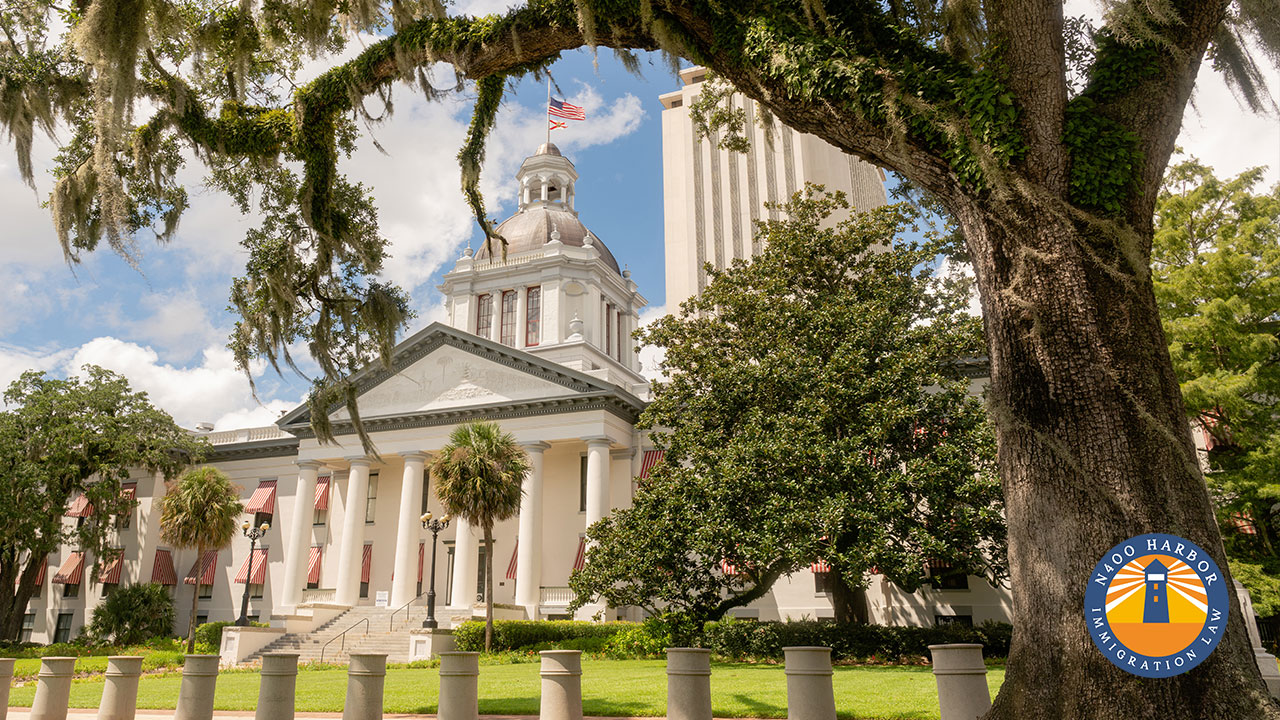
The Florida's Robust Stance Against Illegal Immigration
Facebook
Twitter
LinkedIn
WhatsApp
Email
As a state known for its vibrant diversity and large immigrant population, Florida has recently been in the spotlight due to its stringent approach towards immigration. The new Florida Immigration Law, Florida SB 1718, has grabbed headlines nationwide for its comprehensive and firm strategies to curb unauthorized immigration.
Let’s dive into the details of the law, its implications, and the heated debates (pros & cons) it has sparked among various stakeholders. As always, this article is written for general information only, and does not represent any form of legal advice. If you are affected by this law, please contact us today for legal counsel about immigration.
8 Facts about Florida SB 1718
- If you entered the United States legally, and hold an active visa or legal status, this law will not affect you.
- Section 448.095, Florida Statutes, currently requires employers to verify a person’s employment eligibility using the “E-Verify” system after making an offer of employment.
- If you are an employer, an independent contractor “hired to perform a specified portion of labor or services”, that person is not an employee; therefore is not required to provide proof of eligibility via E-Verify.
- If you do not have a legal status in the US and need medical assistance, hospitals will not contact Immigration and Customs Enforcement (ICE) officers when treating a patient.
- If you do not have a legal status in the US and have a valid Driver’s License from another state or country, you cannot use it to legally drive in the State of Florida.
- SB 1718 repeals a 2014 law that allowed undocumented immigrants to be admitted to practice law in Florida. So, If you do not have a legal status in the US, you cannot become a licensed attorney.
- SB 1718 is designed to combat human trafficking in the State of Florida.
- SB 1718 provides that the knowing and willful transport of an adult immigrant whom the transporter knows or reasonably should know to be undocumented will constitute a third-degree felony.
IN THIS ARTICLE
Florida SB 1718: An Overview
Introduced in 2023, the Florida SB 1718 (Senate Bill 1718) aims to regulate individuals who might be unauthorized aliens living in the state. This new Florida Immigration law has been conceived against the backdrop of the federal government’s 2023 border policies, which have been criticized for their potential to trigger illegal immigration.
The law is composed of several elements, each designed to address a specific aspect of immigration. From stricter employment requirements to amendments in healthcare policies, Florida SB 1718 is a multifaceted legislation that has stirred discussions nationwide.
“Florida SB 1718 is a multifaceted legislation that has stirred discussions nationwide.”
A Deep Dive into the Law's Provisions
The legislation has left no stone unturned in its quest to regulate illegal immigration. Let’s dissect some of the key provisions of Florida SB 1718.
Employment Regulations
The law has a strong focus on curtailing the employment of unauthorized aliens. It mandates that employers verify a new employee’s eligibility to work within three business days of their first working day.
From July 1, 2023, private employers with 25 or more employees will be required to use the federal E-Verify system to verify a new employee’s employment eligibility. Public agencies are also required to use the E-Verify system under the law. The Florida Immigration law further prescribes that it is unlawful to knowingly hire, employ, recruit, or refer a foreign national who is not authorized to work in the U.S. for public or private employment within the state.
Healthcare Provisions
In the healthcare sector, Florida SB 1718 imposes an obligation on hospitals that accept Medicaid. These hospitals are required to include a question on their patient admission or registration forms asking whether the patient is a U.S. citizen, is lawfully present in the U.S., or is not lawfully present in the U.S.
Driver’s License Regulations
The law further stipulates that driver’s licenses and permits issued by other states exclusively to undocumented immigrants will no longer be recognized in Florida. This provision effectively invalidates the use of such licenses in the state.
Juvenile DNA Database
Another provision that has sparked debate is the requirement for arrested adults and even juveniles with an immigration detainer to provide their DNA to the state.

Strengthening the Role of Law Enforcement
Florida SB 1718 significantly expands the scope of the Florida Department of Law Enforcement’s (FDLE) mission to include immigration matters.
The legislation states that the FDLE, with respect to counter-terrorism efforts and responses to acts of terrorism within or affecting the state, will coordinate with and provide assistance to the federal government in the enforcement of federal immigration laws and responses to immigration enforcement incidents within or affecting Florida.
Funding Provisions
The legislation also appropriates a nonrecurring sum of $12 million from the General Revenue Fund to the Division of Emergency Management for the 2023-2024 fiscal year for the Unauthorized Alien Transport Program.
The Law's Enforcement Mechanisms
The enforcement of the E-Verify requirement lies with Florida’s Department of Economic Opportunity. An infographic on the governor’s website states that employers who fail to use E-Verify will be fined $1,000 a day. For workers, it will be a felony to use a false ID to get a job.
However, these penalties apply only after an employer fails to use the database three or more times within two years. In such instances, the DEO can also suspend applicable business licenses until the employer provides proof of compliance.
Controversies and Criticisms
Florida SB 1718 has not been without its share of controversies and criticisms. Critics argue that the legislation could “dilute” Florida’s anti-terrorism resources, lead to significant costs for taxpayers in fighting legal challenges, and harm businesses and undocumented immigrants.
Here some statements by proponents and critics of this law:
“The Biden Border Crisis has wreaked havoc across the United States and has put Americans in danger. In Florida, we will not stand idly by while the federal government abandons its lawful duties to protect our country.” said Governor Ron DeSantis
“Our Southern Border has been dealing with a manmade crisis under the ineptness of President Biden, allowing more than 6.3 million illegal immigrants to flood our border,” said Senator Blaise Ingoglia.
“Immigrants are the backbone of this country” and “this bill does not reflect the values we share in this chamber. It is cruel.” said Rep. Marie Woodson during the Florida House debate.
In regard to Florida’s agriculture, construction and hospitality sectors,
“These are industries where immigrants make up the vast majority of workers, and not allowing businesses to be able to utilize these workers will have a really big impact on our economy and their ability to create jobs,” said Samuel Vilchez Santiago, Florida director of the American Business Immigration Coalition.
The legislation’s enforcement mechanisms have also come under scrutiny. Critics argue that the law’s E-Verify mandate does not substantially decrease the employment of unauthorized workers or deter unlawful immigration.
Implications for Businesses
The stringent employment regulations proposed in Florida SB 1718 have raised concerns among the business community. Industries such as agriculture, construction, and hospitality, where immigrants make up a significant proportion of the workforce, are expected to be heavily impacted.
The law’s E-Verify mandate, in particular, has drawn criticism. Critics argue that it may lead to significant losses in the state’s GDP, reduced state and local tax revenue, and a decrease in workers’ spending power.
Our Takeaway
The Florida SB 1718 legislation is a variation of immigration laws that have been around for decades. Although it may seem as an “new” anti-immigration law, it is more like an affirmation of what the Immigration and Nationality Act already specifies.
Specifically, it has never been legal to be in the United States without proper authorization; nor has it been legal to work in the United States without authorization; nor is it legal to drive in the United States without a valid driver’s license. Moreover, the E-Verify has been a method to confirm the legality of a corporation’s workforce for several years now.
The bottom line is that although we see this legislation causing an anti-immigration rhetoric, it is only a variation of the immigration laws that we have.
This is not to say that the Florida SB 1718 does not include some new provisions that are more expansive but should not make people panic. A new provision from SB 1718 such as hospitals having to inquire about the patients immigration history is novel, however, hospitals are not the police and will not contact Immigration and Customs Enforcement (ICE) officers when treating a patient.
The underlying objective of this policy is to see how much government spending that goes towards hospitals is being given to people who are illegal immigrants.
What must be understood from this is that people who are undocumented are at risk; nevertheless, keep in mind that they always have been since they have no valid status that allows them to be here.
After working in immigration law since 2011, I can tell you objectively that the field of immigration law is a continuously evolving system and people should consult an experienced immigration attorney before jumping to conclusion because of what they hear in the news or social media.
The Road Ahead
As Florida braces for the implementation of SB 1718, the legislation continues to be a topic of heated debate. Its proponents argue that this new Florida immigration law is a necessary step in protecting the state’s resources, while critics argue that it is an undue burden on businesses, workers, and the state’s economy.
Despite the controversy, one thing is clear: Florida SB 1718 represents a significant turning point in the state’s approach to immigration, the impact of which will only become fully apparent in the years to come. Here at N400 Harbor Immigration Law, we can help and guide you navigate the process of immigration to the United States and our laws and regulations. Contact us today for a free consultation.
Resources Used:
- https://www.flsenate.gov/Session/Bill/2023/1718
- https://www.flsenate.gov/Session/Bill/2023/1718/BillText/er/PDF
- https://flgov.com/2023/05/10/governor-ron-desantis-signs-strongest-anti-illegal-immigration-legislation-in-the-country-to-combat-bidens-border-crisis/
- https://www.npr.org/2023/05/30/1177657218/florida-anti-immigration-law-1718-desantis
- https://www.pnj.com/story/news/politics/2023/05/10/florida-immigration-bill-sb-1718-signed-into-law-by-desantis/70203097007/

